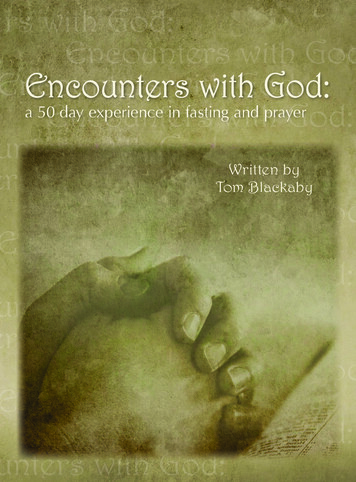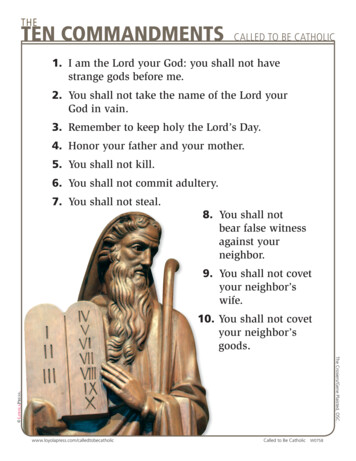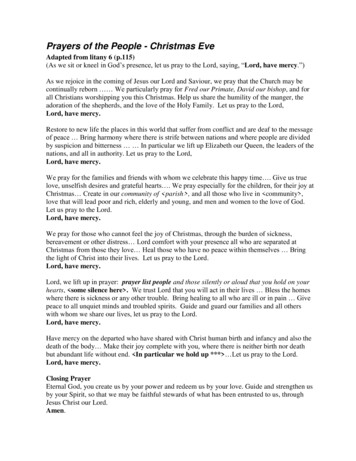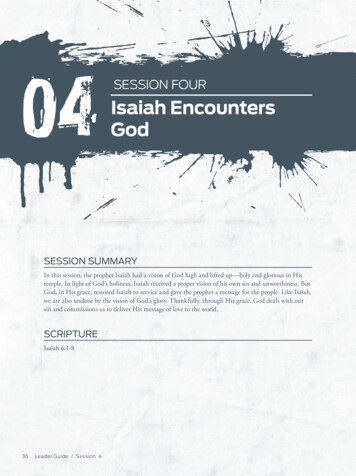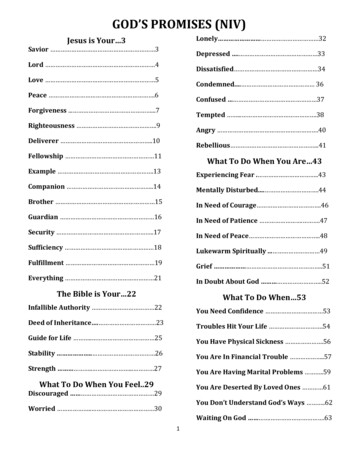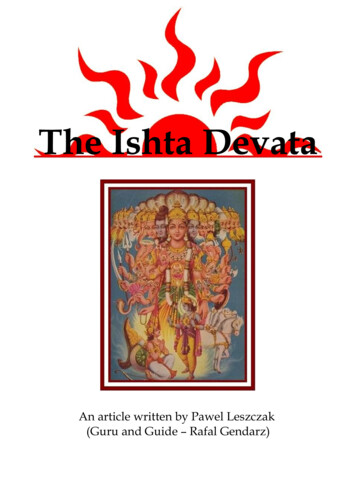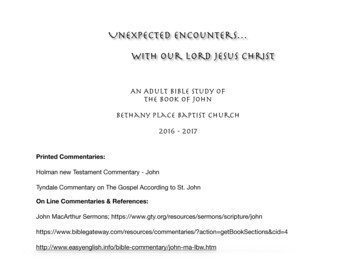
Transcription
UnExpected Encounters With our Lord Jesus ChristAn Adult Bible Study ofThe Book of johnBethany Place Baptist Church2016 - 2017Printed Commentaries:Holman new Testament Commentary - JohnTyndale Commentary on The Gospel According to St. JohnOn Line Commentaries & References:John MacArthur Sermons; ies/?action getBookSections&cid -ma-lbw.htm
UnExpected Encounters Bethany Place Baptist ChurchBible Community Study of JohnWith our Lord Jesus ChristPart 1. Overview & Jesus’ Ministry YearsPageWeek Month4152637Sept.DateJOHN18Themes, Events & Unexpected Encounters Overview & Uniqueness of John, Theme, Time Period, etc.251:1-18The Eternal Word Arrives and John the Baptist21:19-51John the Baptist & The First Disciples492:1-22The Wedding Celebrants & Temple Merchants85163:1-35Nicodemus & John the Baptist96234:1-42The Samaritan Woman at the Well107304:43-5:4711866:1-715,000 People Fed & Jesus Sermon on Bread of Life129137:1-53Jesus’ Brothers & UnExpected Encounters at the Temple1310208:1-59The Adulterous Woman & Jesus, The Light of the World1411279:1-53The Blind Man & Religious Leaders1512410:1-42The Good Shepherd, His Sheep & Angry CrowdsOct.Nov.Dec.The Sick Healed on The Sabbath & The Jewish Leaders
Bethany Place Baptist ChurchBible Community Study of JohnUnExpected Encounters With our Lord Jesus ChristPart 2. Jesus’ Last Week, Death & ResurrectionPageWeek MonthDateJOHNThemes, Events & Unexpected Encounters 16131111:1-57Lazarus, Mary & Plotting Priests17141912:1-50Anointment at Bethany & Entrance into Jerusalem251815Jan.1CHRISTMAS DAY13:1-388The Passover Meal - The Last 33Jesus & The Disciples - The Holy Spirit, Sadness & Joy2219517:1-24Jesus’ Final Prayer for the Disciples23201218:1-27Jesus Give Himself Up & Peter Denies Him24211918:27-19:1625222619:17-42Jesus’ Death & Burial2623520:1-31Jesus’ Resurrection - Mary, Peter, John & Disciples27241221:1-25Final Legacy Learnings & Summary of StudyFeb.MarchJesus’ Words of Comfort & PromiseLegacy Learnings - The Vine & BranchesJesus’ Trials & Pilate’s Interrogations
UnExpected Encounters With our Lord Jesus ChristBible Community StudyThe Book of JohnWeek 1 - Overview of JohnTheme & PersonalBible MarkersTheme of Study of John is “UnExpected Encounters;” every chapter contains one of more personal stories aboutan “unexpected encounter" with Jesus. Throughout this study, we will share our own personal stories ofexperiencing - and creating - UnExpected Encounters with our Lord Jesus Christ.Matthew, Mark,Luke & JohnMatthew, Mark, and Luke are knows as the three synoptic gospels. The word synoptic means see-together andthe first three Gospels present the life of Jesus in pretty much the same format. The first three Gospels focus moreon what Jesus taught and did; John focused more on who Jesus is.Jesus’ Introductionsby the Four GospelsMatthew shows Jesus came from Abraham through David, and demonstrates that He is the Messiah promised inthe Old Testament (Matthew 1:1-17). Mark shows Jesus came from Nazareth, demonstrating that Jesus is aServant (Mark 1:9). Luke shows Jesus came from Adam, demonstrating that Jesus is the Perfect Man (Luke3:23-38). John shows Jesus came from heaven, demonstrating that Jesus is God. (Chapter 1, next week)Geographic Coverageof the Four GospelsThe first three Gospels mainly center on Jesus’s ministry in Galilee. John centers his Gospel on what Jesus saidand did in Jerusalem. The first 11 chapters of John’s Gospel focuses on Jesus’ three-year ministry; the last 10chapters cover His last week with the Apostles, His Death and Resurrection.Who was John ?John doesn't tell us much about himself in his Gospel, but we can put a few things together about him. John'sfather was Zebedee; his mother was Salome, one of those to go to the tomb early on the morning the Jesus’resurrection of Jesus. John’s brother was James and he was a partner in a fishing business with Peter; John andJames were given the nickname, "Sons of Thunder.”Uniqueness of John’sGospelWritten about 85-90 AD, the Gospel of John was probably the last of the four written, and perhaps in view of whatthe previous three had already shared. This is one reason why John's account of the life of Jesus is in many waysdifferent from Matthew, Mark, and Luke.Miracles & SignsMatthew, Mark & Luke describe many of Jesus’ “Miracles,” using Greek word meaning ‘raw power.’ John onlymentions seven, which he calls “Signs,” meaning that Jesus was who He claimed and that, in doing them, He wasrevealing the “Father” to the world through Jesus.The Prophets believed in the “Promised One to Come;” John’s testimony is that Jesus, the “Promised One,” came !Recording God’s signs, Jesus’ words and UnExpected encounters with many people, John encourages his readersto believe that Jesus is the “Messiah, God’s Son’” (John 20:31). And John encourages each of us to invest moretime in God’s word, to share his love and to present the gospel to others around us (John 3:16).The “Explore God” sermons start with this question: “Does Life have a Purpose ?.” How does our calling to beDisciples add real meaning to our daily lives ? Do those around us see purpose and meaning in our lives?4
UnExpected Encounters With our Lord Jesus ChristBible Community StudyThe Book of JohnWeek 2 - The Eternal Word& John The baptistIn the Beginning,was the Word !The Word, Jesus, has always existed. Before he lived on the earth, he was with God. He was God. Jesus was withGod the Father, even when God created the world. And Jesus himself is God the Son. But there are not two Gods.There is only one God (Deuteronomy 6:4). This might seem difficult to understand. But Jesus himself said, ‘I andthe *Father are One (one God)’ (John 10:30). Of course, He later gave us the “Holy Spirit” to live with us.Jesus, The Word& Creator of LifeGod created everything through the Word. To create means ‘to think of something and then to make it’. Thismeans that Jesus gave life to everything that God created. The word ‘life’ is very important in John’s Gospel andused it 35 times. Here, ‘life’ does not mean just a physical body that is alive - our spirits become alive too.Jesus, The Lightof the World“Light” is another important word that John used 21 times. Jesus called himself ‘the *light for the world’ twice(John 8:12; 9:5). He was writing about jesus, our spiritual light that shines and shows us how to live our lives.When we choose to follow the light, we let Jesus in our lives and guide us in the paths that he wants us to followGod’s Light &The world’s DarknessSIN is our “Self Indulgent Nature” that is the ‘spiritual darkness’ John describes; it is the opposite of God’s light,who is Jesus. The darkness has never understood the light.’ People who do not believe in Jesus do not follow hiswords. Yet, the light of Jesus continues to shine in the darkness and the darkness of SIN will never defeat it.In Summary The Eternal Word came into the very world that He created. The Word became flesh; He lived with us and Heshowed us how to live. He even gave up His life for us on earth that we can have eternal life with Him in Heaven.1:6-14John The BaptistJohn the Baptist was God’s last Biblical prophet, who spoke God’s messages to people. Preaching to crowdswho came to hear him speak, John told them that the Messiah was coming. He told them to prepare for this event.1:15-18John the Baptist’sTestimonyJohn the Baptist was not the “light,”but he reflected the light. This was because he told people about Jesus. Wecan reflect God’s light, too, when we tell people about Jesus. John was different and bold; he kept his ‘pride’ incheck and invested his life as God’s agent to tell people the Messiah is coming - repent and to receive baptism1:1-5One questions from “Explore God” series was: “Is there a God?” How did you answer this questionbefore and after experiencing God’s love and grace through your personal encounter with Jesus ?The first unexpected encounter John recorded in Chapter 1 is Jesus entering the world.The Eternal Word came into the world and forever changed the world !When the eternal word came into your life, how has he forever changed you ?5
UnExpected Encounters With our Lord Jesus ChristBible Community StudyThe Book of JohnWeek 3 - John the Baptistand the first disciplesEncounter with thePhariseesPharisees promised to obey the “Law,” as well as obey all the extra rules in addition to the rules that God hadmade. Therefore, most Pharisees became proud and thought that they were better than other people. Jesus saidthat Pharisees obeyed the Law for the wrong reasons - to impress other people and appear clever and important.They were more interested in power and position than meaningful relationships with God or His people Israel.John’s encounter with the Pharisees reflects their pride and judgmental attitude in asking about jesus.1:29-34“Look - the Lamb ofGod” is hereUpon seeing Jesus, John the Baptist proclaimed this phrase. 1. Because people constantly sin, a lamb wassacrificed in the Temple for the people’s sins every morning and evening (Exodus 29:38-42). Jesus became the“Lamb of God” who took on the sin of all time. 2. At Passover celebrations, people remembered that, when Godhad seen the lambs’ blood on their houses, he protected them. The lambs’ blood had saved them from death. Inthe same way, Jesus’ blood saves us from death. John’s message: ‘Look - the Lamb of God and believe in Him !’1:35-51Teaching the EarlyDisciplesJohn records Jesus’ encounters with Jesus’ first Disciples. Disciples were then - and are today - followers orstudents of Jesus Christ. The early Disciples prioritized being with and listening to God’s Word, Jesus Christ.Today, Discipleship means that investing daily time in God’s Word is a top priority for each of us.Calling The 12 Apostles& Jesus’ GreatCommission to Us AllThe 12 Apostles were among the hundreds of Jesus’ early Disciples, but they were specifically chosen by Him tolive, travel and learn from Him first hand throughout His ministry. So, in addition to being Disciples of Jesus, the12 Apostles were personally trained by Him and were later sent out as messengers to preach Christianity and leadHis Churches. Today, Jesus wants each of us to do the same. As Disciples, we are to also follow His lastinstructions to the 12 Apostles: Go, make Disciples, baptize and teach them to obey Him (The Great Commission).Nathaniel’sUnexpected EncounterWhen Philip witnesses to his friend Nathaniel, he prejudices himself against Jesus by asking: “Can anything goodcome out of Nazareth?” Instead of arguing, Philip simply invites him to come and meet Jesus. When Jesus said: Isaw you earlier ‘under fig tree’ (Rabbi term for studying the Scriptures) before Philip met you, Nathaniel at oncedeclares him “Rabbi, Son of God and King of Israel!” How can we apply Philip’s approach then to our lives today?The 12 ApostlesPeter, Andrew, James, John, Philip and Nathaniel were the first “Apostles” who had UnExpected Encounters withJesus. The other initial Apostles were Thomas, Matthew, James (the Less), Judas, Simon, and Judas Iscariot.1:19-281:45-51The Greek roots of the words “disciple” and “apostle” make the difference between the two clear. The Greek wordfor disciple literally means student or follower, while the Greek word for apostle means a messenger or sent one.In that context, does God expect and equip us to be both followers of Jesus as well as messengers for him ?To be effective in carrying our the great commission, don’t we need to have the attitude of a discipleas well as be proactive and mission minded like Jesus’ 12 apostles were ? How do we do that ?6
UnExpected Encounters With our Lord Jesus Christ2:1-32:4-112:13-25Bible Community StudyThe Book of JohnWeek 4 - The Wedding Celebrants& Temple MerchantsThe Wedding FeastMost scholars believe that Jesus lived at home until He was 30 and ready to begin His ministry. Mary was invitedto a special wedding and Jesus and His disciples also attended. This is the first of many stories suggesting thatJesus was always welcome among those having a good time. In Israel, weddings are very special occasions. Afterthe ceremony, the family gave a week-long party. This time the wine ran out, embarrassing the family.Mary, Jesus &The Miraculous SignKnowing of Jesus’ powers, Mary asked Jesus to help. His response to her was that He was not ready to launchHis ministry with a miracle. However, being sure that Jesus would help, she told the servants to do whateverJesus told them. Jesus began this miracle by using what was at hand. He could have supplied more wine anynumber of ways, but He started with what was there. Importantly, the waterpots are connected with the system ofLaw, because they were used in ceremonial purification.Meaning ofThe Miraculous SignTurning water into wine showed Mary and the Disciples that Jesus had power over nature. It showed that he spokewith authority, that He enjoyed being with people and did not spoil a good time. And it shows us that wonderfulthings happened when people obeyed him then - and still do now when we follow His commandments.The Temple Officials,Merchants &MoneychangersDuring Passover, Jesus went to the Temple in Jerusalem. There He saw the temple officials were not fair orhonest. They rejected any animals that people had brought with them, and forced everyone to buy animals fromthe Temple merchants. But these animals were very expensive and the merchants made a big profit; likewise, themoneychangers there charged high exchange rates. The merchants and the moneychangers did not respect God’shouse - and they did not respect the people who came to worship him there. Seeing all of this made Jesus angry.Disciplined AngerWhen Jesus drove those doing business out of the Temple courts, He did not do it in a flash of uncontrolled anger.He carefully took the time to make a whip of cords, and thought carefully about what He would do. Jesusdemonstrated that disciplined anger is appropriate when God’s place and His people are treated unjustly.Questioned AuthorityThe Jewish leaders demanded a “sign” that Jesus had the authority to cleanse the Temple. Jesus response wasnot understood by the Disciples until later. Jesus speaks here of the temple of His body. He knew that religiousleaders would destroy His body, but He also knew that they would not succeed. He would rise on the third day !One of the “Explore God” sessions asks the question: “Is there a God?” One might also ask: If there is a God,does He care about me ? Chapter two ‘encounters’ with Jesus answer both questions with a resounding “YES !”Jesus proved he was the Messiah by changing ceremonial pots of water into wine. He also proved thatHe cared for his people and became angry when money changers took advantage of God’s peoplewho came to gather, sacrifice and worship God at the temple in Jerusalem during passover.Using your own personal encounters with Jesus,how do you answer these two important questions ?7
UnExpected Encounters With our Lord Jesus Christ3:1-23:3-143:15-21Bible Community StudyThe Book of JohnWeek 5 - Nicodemus &John the BaptistNicodemus’Unexpected EncounterNicodemus was a member of the Sanhedrin, a group of 70 Jewish leaders, plus the High Priest. He was religious,well educated, and was impressed with Jesus’ ‘signs.’ He came and met Jesus at night, perhaps so others wouldnot see him, or maybe he wanted more one-on-one time with Him. He respectfully called Jesus ‘Rabbi,’ sayingthat, through the ‘signs,’ he know that God has sent Jesus to teach us. Nicodemus said: Teacher, please teach me.Jesus’ Response:Must Be “Born Again”Jews of that time looked for the Messiah to talk about Israel’s new kingdom on earth. Instead Jesus talked aboutGod’s Kingdom in Heaven. He said to become a citizen of God’s Kingdom, a person needs two births. The first isthe natural birth of the body, by ‘water’. This happens by means of one’s parents. The second birth is a ‘spiritualbirth, and only the Holy Spirit can make this happen. We cannot get this new life by ourselves. Only the Holy Spiritcan give it to us. It is a magnificent gift from God (see Romans 8:16; 1 Corinthians 2:10-12; 1 Thessalonians 1:5-6).God’s Love & GiftJesus powerfully summarized the Gospel in John 3:16. God loves everyone, ‘the world,’ not just Israel. God’s lovedidn’t just feel sorry for our fallen world; He did something about it. God gave the most precious thing that Hecould give us - His only begotten Son to die for our sins and offer us eternal life to everyone who believes in Him.Eternal life is God’s free gift to us. There is only one way to receive it. We must believe in Jesus. To ‘believe in’means more than just to know that Jesus is God. It means understanding that Jesus is the one who has come todie for our sins – that we are sinful and in need of a savior and that we cannot do it on our own. Belief involvesrepentance and relying on Jesus’ death for our salvation. Also, we ‘believe’ that He has plans for us, and that allHis words in the Bible are true. We believe that He gives us the power to change our lives and live our lives for Him.3:22-36Nicodemus’ ResponseGod designed people so that we would be able to make decisions for ourselves. He does not force us to believe inJesus. He does not force us to receive Eternal Life. He offers it to us. But we must choose it or reject it. Johndoesn’t record Nicodemus’ response. Did Nicodemus become a ‘believer?’ All we know is that he stood up forJesus at His trial; and, after Jesus’ crucifixion, he bought expensive perfume and helped with Jesus’ burial.John the BaptistExalts JesusAs Jesus’ ministry grew, John’s disciples seemed alarmed, but it didn’t bother John. He would not allow envy orsmaller crowds make him forget his mission: to announce that the Messiah had come, and then to step back andlet the attention be focused upon Jesus. Shouldn’t this be the goal of every Christian, especially leaders of God’speople; Jesus should become greater and more visible, and the servant should become less and less visible.“Eternal life” does not mean our lives in this world continue without an end. Many Christians live difficult lives; they are poor, hungry, ill, orthey suffer with pain and sin. But eternal life means the wonderful ‘life’ that God gives to us by means of Jesus - there will no more death,or disease, or struggle with sin. God promises that He is with us here on earth and that we will live with Him in Heaven for all eternity !Difficulty and disappointments come in every Christian’s life - job loss, sickness, temptations, sin, broken relationships, etc. What are thedifferent ways that God helps us get through difficulties and disappointments in life today knowing that we have eternal life with Him ?How does God call us to create ‘unexpected encounters’ with other Christians who are struggling with difficulties in their lives ?8
UnExpected Encounters With our Lord Jesus Christ4:1-44:5-114:16-194:20-264:27-42Bible Community StudyThe Book of JohnWeek 6- The SamaritanWoman at the WellBackground & Jesus’Trip through SamariaBecause the Samaritans had a historical connection to the people of Israel, their faith was a combination of commandsand rituals from the Law of Moses and pagan ideas. The Samaritans built their own temple to Yahweh on Mount Gerizim,but the Jews burned it around 128 b.c. Most strict Jews in Jesus’ time distained the Samaritans even more than Gentiles.Jesus decided to go to Galilee through Samaria on purpose because these people needed to hear the Gospel too.Jesus atJacob’s WellJesus came to Samaria’s capital city, Sychar, which is near the plot of ground that Jacob gave to his son Joseph. Beingtired and thirsty from the trip, Jesus sat alone by ‘Jacob’s Well,’ while his Disciples went into the town for food. Soon, aSamaritan woman arrived; Jesus was tired but not too tired to engage in conversation with her. The woman was verysurprised when Jesus talked to her because Jews would not talk to Samaritans. But Jesus needed something that shehad; He needed a drink of water. And Jesus had something that she needed, too; but she did not realize this at the time.Jesus’ EngagingConversationJesus drew the woman into conversation, making her curious about several things. He made her curious about the thingsof God (If you knew the gift of God). He made her curious about who Jesus is (and who you are talking with). He made hercurious about what He could give her (you would ask me for living water). Jesus easily talked about physical water thenabout spiritual gift of “living waters.” He shows us that engaging conversations can lead to engaged converts.Revealing Her Past &Assuring Her FutureJesus ‘sign’ of revealing her past and current martial status did two things: 1) She was surprised, perhaps stunned thatJesus had supernatural knowledge of her sinful life; 2) She realized the spiritual importance of her encounter with Jesus.Jesus displayed so much love and such a sense of security that she felt safe with Him even when her sin was exposed.We should follow Jesus’ example: give people today a safe place to confess their sin, repent, and put their trust in Jesus.Worship InSpirit & TruthShe then talked about the correct place to worship God. The Samaritans’ scriptures consisted of the first 5 Law books ofthe Bible, The Jewish scriptures included the entire Old Testament. The Samaritans worshiped God on Mount Gerizim, butbut Jews worshipped Him in the Jerusalem’s Temple. Jesus responded that God is Spirit and, when we come before Himin true spiritual relationship, we can worship Him anywhere, not just at religious sites. And when we worship Him in Truth,we worship Him for the “Truth” that Jesus revealed to us - God’s love, grace and salvation through belief in Jesus Christ.So worshiping in ‘Spirit and Truth” is related to the very character of God and the identity of Christ.Urgency & Energy inSharing the GospelJesus teaches His disciples about the urgency of spiritual work and opportunity. “Lift up your eyes and look at the fields,for they are already white for harvest!” Jesus used the idea of food and harvest to communicate spiritual ideas. The ideaof harvest meant that there were many people ready to be received into the Kingdom of God, and that the disciples shouldsee themselves as workers - reapers - in that harvest. As he spoke, thousands of Samaritans came to Him for salvation.At first, the Samaritan woman called Jesus a “Jew;” then “Sir” and “Prophet.” In later conversations she thought that He might be the Messiah.Finally, as she told the villagers of her experience with Jesus - and after they spent time with Him themselves - they all declared: “Now we knowthat He is indeed the ‘Savior of the World.’ Sometimes we think that “Being a Disciple who Makes Disciples” takes a lot of time and training. Sheshows all it takes is a personal and life-changing encounter with Jesus. A person cannot know Jesus by means of another person’s encounterwith Him. We must tell others what Jesus has done for us and then invite them to meet Him and to have their own personal experience with Jesus.9
UnExpected Encounters With our Lord Jesus ChristBible Community StudyThe Book of JohnWeek 7 - The Sick Healed on TheSabbath & The Jewish LeadersUnExpectedEncountersLast week, we discussed the Woman at the Well’s ‘unexpected encounter’ with Jesus. What ‘unexpected encounters’ didclass members have this week to start engaged conversations about meaningful things ? How can we encourage eachother to be prepared for - and create - ‘unexpected encounters’ leading to Gospel-sharing opportunities with others ?4:42-54The Official’sUnexpected Encounterwith JesusAs Jesus traveled through Galilee, a government official humbly came to Jesus because his son was back home dying. Hebelieved that Jesus could help. While the official had legal authority over Jesus, he still called Him ‘Sir’ and begged Him tocome save his son. Testing the man’s faith, Jesus simply told him to go home - “his son would live.” The official believedJesus, and on the 20-mile trip back home, servants came with great news of his son’s recovery, which happened at themoment Jesus said his son would live. The official’s first step of faith was to come to Jesus, his second faith step was tohead back home trusting Jesus, the third step for him and his family was to ‘fully believe’ in Jesus when his son survived.5:1-18Jesus’ Question to theParalyzed Man:“Do you want to bemade well?”His question may seem rhetorical, but Jesus knows that not every sick person thinks he can be healed, and that some areso discouraged that they put away all hope. Jesus is dealing with a man who may have his heart withered as well as hislegs. Are there times when we are more comfortable in our present misery than taking the bold and unfamiliar steps weneed to be free? Jesus builds the man’s hope and faith with this question; and, at times, He does the same for each of us.The Man’s Response:“I can’t sir, because ”Calvin comments: "The sick man did what we nearly all do. He limits God's help to his own ideas and does not darepromise himself more that he conceives in his mind.” At times, are we guilty of thinking the same way when we pray ?The Jewish Leaders:Angry and JealousThe crowds were surprised by this ‘sign’; but the Jewish leaders were angry at the man carrying his mat on the Sabbath.They were angry at him because they were jealous of Jesus, seeing the miracles God was doing through Him.Jesus: “That all shouldhonor the Son just asthey honor the Father.”Along with wondrous ‘signs,’ Jesus’ further claims His Deity. If the Son were not God, then it would be wrong to honor theSon just as they honor the Father. It also means that if we do not honor the Son, we do not really honor the Father either.The Jewish leaders were pious about their clean hands; but God seeks people with clean, honest and repentant hearts.Choices about JesusThe Jewish leaders had a choice. They could believe that Jesus was God’s Son; or they could say that he was insultingGod - a capital crime. They chose to accuse Jesus of the crime. People today must choose too. We can believe Jesuswhen He said that He is God’s Son, that He is the Messiah of the Scriptures and that eternal life is only found in Him. Orwe can say that His words are lies and that God does not exist. There are only two choices, and everyone must choose.5:19-47God enabled Jesus to perform ‘signs and wonders’ to validate Jesus, His heavenly messenger. Jesus’ frustration with the Galilee crowdswas that they wanted to see a ‘miracle’ before they would believe in Him. So, Jesus severely tested the official’s faith, forcing him to believein Jesus' word alone; “But the man took Jesus at His word and departed” (NIV). All Jesus gave him to trust in was His word. But isn’t realDiscipleship faith simply that - taking Jesus at His word ? Just like the official’s three steps of faith noted above - each led to deeper, nextsteps of saving faith in Jesus. John emphasizes that Jesus’ ‘signs’ were not products of faith; they produced faith, in the lives of the official’sfamily and the paralyzed man. What a difference it makes in our lives today when we really believe what Jesus says and trust in Him alone !10
UnExpected Encounters With our Lord Jesus Christ6:1-15Bible Community StudyThe Book of JohnWeek 8 - 5,000 People Fed &Jesus’ Sermon on Bread of LifeWorld Hunger perUnited Nations ReportThe feeding of the five thousand is Jesus’ only ‘miracle’ that is recorded in all four Gospels. Hunger was and continues tobe a worldwide problem. Today, 795 million people continue to struggle with hunger every day. 1.2 billion people still livein extreme poverty — on less than 1.25 per day. Each year, 2.6 million children die as a result of hunger-related causes.Feeding the 5,000Jesus went out to a deserted place to be alone (Luke 9:10), to teach His Disciples and get away from the Jewish leaders.Yet the crowds followed Jesus there, and they were joined by many other travelers heading to Jerusalem for Passover. Heknew that they were tired and hungry; so he tested Philip, asking where to buy bread to feed everyone ? Philip responded,thinking in terms of money; and how much money it would take to carry out God's work in a small way: “every one of themmay have a little.” We sometimes limit God the same way, looking for how God's work can be done in the smallest way.Barleypoor people & horsesearly cropOT ElishaAndrew noticed a young boy who gave Jesus what is at hand - five cheap barley loaves and a couple of fishes. JesusInstructed everyone to sit in the pasture (remember the green pastures verse in Psalm 23), He blessed the simple mealand the Disciples distributed food to everyone. After everyone was nourished, Jesus had the Disciples gather all leftovers.Jesus fed the 5,000 as a ‘sign’ of who He was - God’s long-promised Savior to free them from sin. But the crowds sawHim as the military king sent by God to free them from the Romans. So Jesus escaped from them. Later, in the synagogueat Capernaum, He tried to explain more about who He was and why he had come to the earth (John 6:22-59).An UnExpectedEncounter on WaterThe Disciples started to row across the Sea of Galilee and meet Jesus at Capernaum, Soon, strong winds arose, it wasdark and they were rowing hard but not getting anywhere. Knowing their struggles, Jesus appears, walking on water,calling out: “Don’t be afraid, I am here!” We will often face trials - rowing hard but getting nowhere - when we set out to doGod’s work. Jesus knows this and understands. We should not think that, if we are really right with God, everything in lifewill be easy. But, we must remember, just at the right time, Jesus calms our fears and gets us to the other side
Recording God’s signs, Jesus’ words and UnExpected encounters with many people, John encourages his readers to believe that Jesus is the “Messiah, God’s Son’” (John 20:31). And John encourages each of us to invest more time in God’s word, to share his love a
